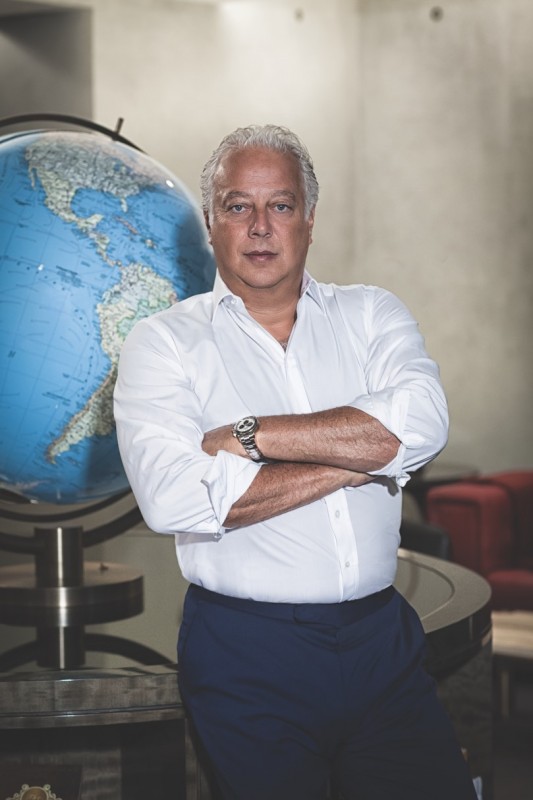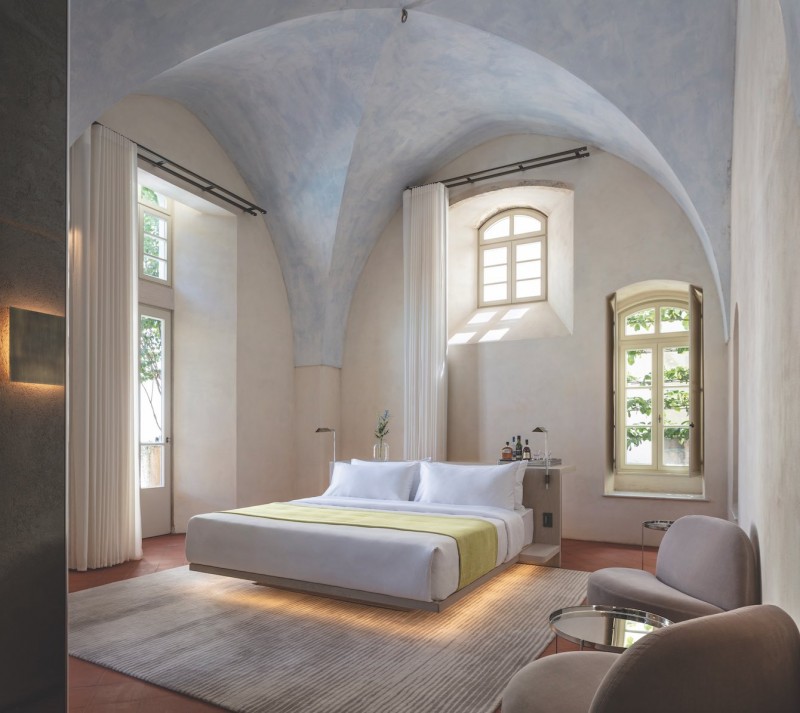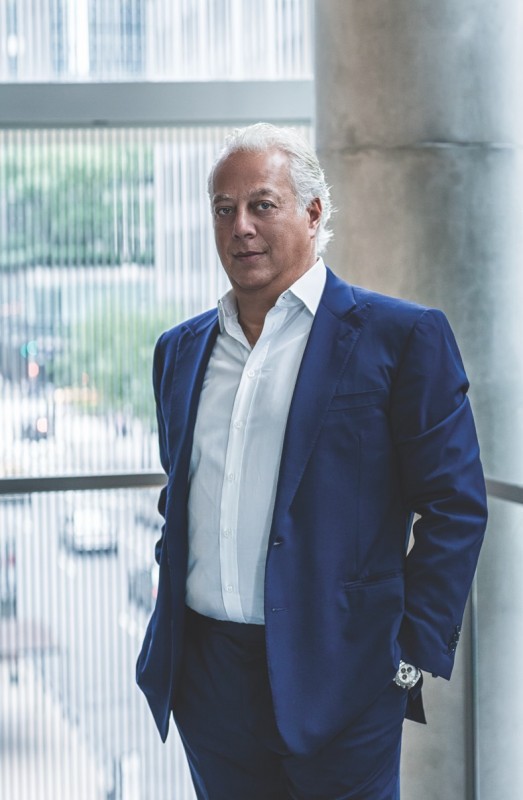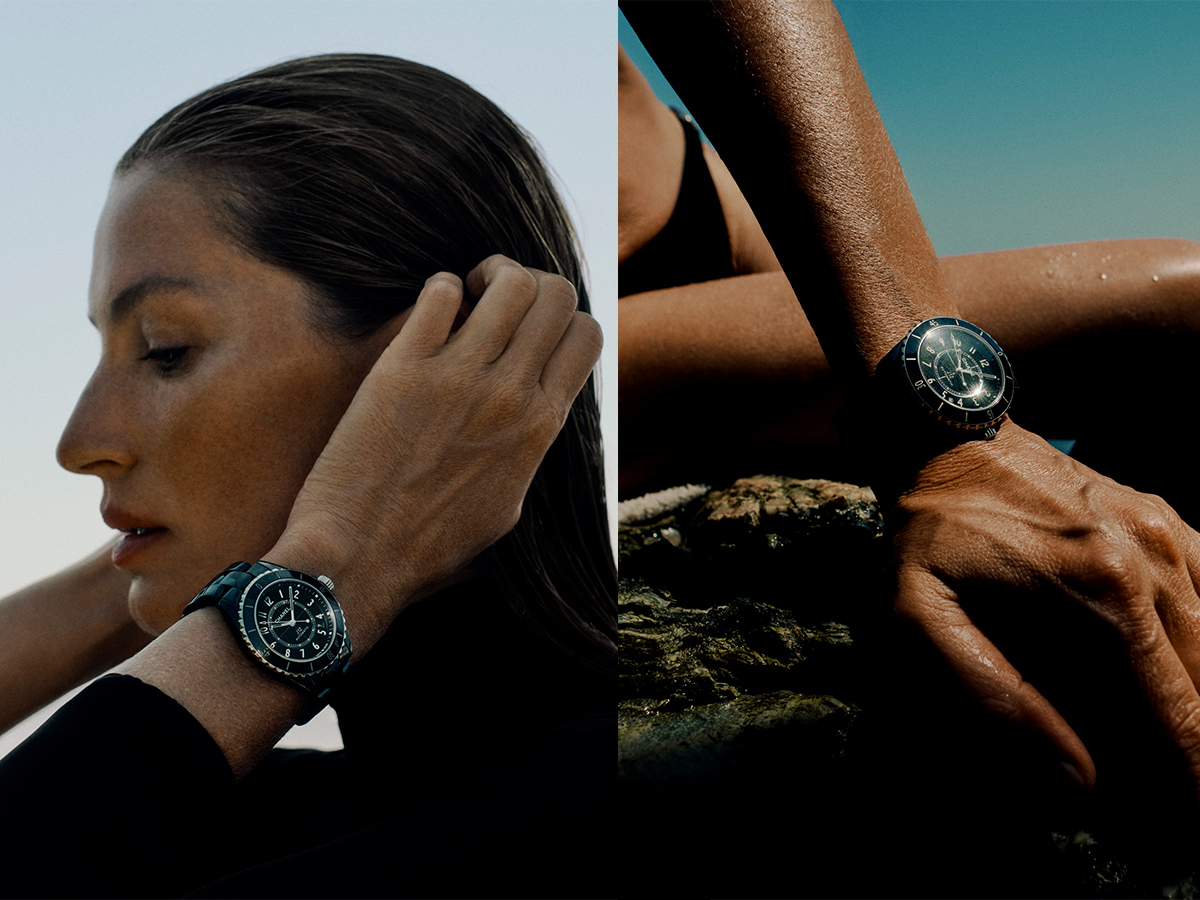Aby Rosen On His Latest Passion Project That’s Slated To Change Tourism In Tel Aviv
 Photo Credit: Jesse David Harris
Photo Credit: Jesse David Harris
Portrait photography by Jesse David Harris
Shot on location at 100 E. 53rd St., New York
Within minutes of speaking to Manhattan-based real estate mogul Aby Rosen, several things are immediately clear. One: He isn’t afraid to dare, or dream impossibly big. Two: He doesn’t care what people think about said risks, or anything else, for that matter. Three: He is who he is, he does what he does, and he does it well. Dispute it if you want, but frankly he couldn’t care less—his success speaks for itself.
“I’m not a pioneer—I don’t go to places people haven’t been to,” he announces. “My philosophy is simple: I make something good better.” Is the statement boastful? Maybe, but that doesn’t mean it isn’t true. Through RFR Holding, the brokerage company he co-founded with longtime friend Michael Fuchs in 1991, Rosen’s vast portfolio includes 90 worldwide properties, including New York skyscrapers like the iconic Seagram Building and the Lever House as well as the Gramercy Park Hotel, the W South Beach in Miami and Roomers, a five-star hotel in his native Frankfurt, Germany.
“I’ve always done that,” says the 58-year-old developer, who cuts a larger-than-life figure with his snowy-white hair, perpetually tanned skin and wide, searching eyes. “I go into something that I know is good, and I add my ingredients to make it a better place. I did not invent South Beach; I added a hotel there, and it did wonders for the whole neighborhood.”

Photo Credit: Amit Geron
Rosen is confident that he’ll be making a similar sort of magic happen in Tel Aviv-Yafo with his latest and most personal project to date, The Jaffa. The Luxury Collection affiliate is both a homage to his Jewish heritage—he is the son of two Holocaust survivors and has been visiting the Holy Land since his childhood—and a way of aiding tourism by building a cosmopolitan centerpiece in Israel’s most exciting city. “I feel good about having it, about owning it,” Rosen says of 120-room and 32-residence historical hotel. And he should—and not just because this particular project took more than a decade to complete.
The project started off strong: After purchasing the property in 2005, Rosen enlisted the help of minimalist architectural designer John Pawson and conservationist architect Ramy Gill to preserve the site’s history, but almost immediately encountered a roadblock. “It’s an uphill battle to do something in Israel, which is a bureaucracy at its best,” he explains. “Getting plans approved took two years. We did excavation work, and we found artifacts from the 13th century, and then we had to bring in the antiquity authorities to help evaluate what we found. It took another three years—with me paying—for the archaeological dig.”
When construction finally got underway in 2013, it took another five years to complete, due in part to Rosen’s infamous attention to detail. “I had a hand in personally selecting everything,” he admits. “There’s not one thing in this hotel that I haven’t personally signed off on, chosen or found. I’m very hands-on. I care about the details, I care about design and I know what I’m doing; all pieces were very deliberately chosen.”

Photo Credit: Amit Geron
Meaning, that if something’s worth doing, it’s worth doing right. “I’m all for quality,” he maintains. “I don’t do four star or B minus; that’s not my business plan. I’m a five-star operator, and I do that from my residential development to my hotels to my condos to my office buildings. Everything I do is top notch and super-expensive. So yes, it took awhile, but I’m stubborn, and when I want something, I’m going to get it done.”
The Jaffa, which officially opened its doors this past August, was worth the wait. The hotel retains all of its historical feel—the façade includes outdoor galleries with arched colonnades, and the plastered walls were scraped down to reveal the generations of patina that touch the building’s signage and paint-patterned walls—yet has every modern amenity a 21st century guest could possibly want, including a high-tech spa courtesy of luxury brand L. Raphael. The lobby is dominated by the prominently displayed remnants of the 13th century crusader’s bastion wall as well as two $1 million paintings courtesy of contemporary artist Damien Hirst (a personal friend of Rosen’s), creating an interesting old-meets-new juxtaposition. Pawson also utilized the old versus new in relation to local culture, incorporating subtle odes to traditional Middle Eastern architecture such as a Mashrabiya and combining it with contemporary photography by Israeli artist Tal Shochat, which is featured in all guest rooms. The end result is stunning—a seamless melding of the past and present fueled by panoramic views of the 4,000-year-old Jaffa Port, Mediterranean Sea and Tel Aviv city.
Needless to say, Rosen got it exactly right, from the mid-century design classics by Shiro Kuramata and Pierre Paulin to a gracefully designed courtyard enveloped under a canopy of trees to the property’s two signature eateries: Don Camillo, a classic Italian restaurant with a Mediterranean twist, and Golda’s Deli, an authentic New York-style Jewish eatery. Both restaurants were created in conjunction with Major Food Group, the award-winning restaurant and hospitality company behind New York staples Carbone and Sadelle’s (as well as The Pool, The Grill and The Lobster Club at Rosen’s Seagram Building in New York) in collaboration with local chef Roi Antebi. Both have intentional whiffs of Manhattan to them, as well. “I bring New York everywhere I go, and for me, it was about bringing the excitement of New York to Israel,” Rosen states.
 Photo Credit: Jesse David Harris
Photo Credit: Jesse David Harris
But he wouldn’t be Aby Rosen if he weren’t creating a little controversy, such as he did by ousting the iconic Four Seasons restaurant from his Seagram building, or erecting a 20-foot-tall anti-Trump billboard outside RFR’s 337 Lafayette Street development site in NoHo. He’s also done it again, this time opting to open a nightclub called The Chapel in a space that once housed an actual church… in the Holy Land. The Chapel pokes gentle references at religion, with a neon sign depicting hands in prayer outside, larger-than-life black-and-white shots of famous cinematic priests, including Frank Sinatra in The Miracle of the Bells and a DJ booth in place of a pulpit.
Rosen knew the space might incite some criticism, but guess what? He didn’t care. “It was the first time that [something like this] was done in Israel,” he says, sounding almost proud. “There are always pros and cons, but that’s what I like and thrive on. I don’t conform; I do things that are a little different.”
He’s quick to add that the decision wasn’t deliberately slanderous—and that he spent serious time restoring the space to its former glory as well as “de-Christianizing” it with the help of local authorities. “I restored it painfully over four years, with the greatest artisans you could find in Israel, including stained glass preservationists and mural painters,” he notes. “I spent a lot of time and energy on that, and the church loved what I did there. The churchgoers who might go, ‘Oh my God, it’s a bar!’ are going to have to get used to it. It wasn’t used for 30 years, and stood empty, so the community never really used it as a church anyway. Now, it can be booked for weddings and bar mitzvahs, so it has a communal aspect, and that’s all I cared about.”
This sense of creating a community, of place, is a common theme for Rosen throughout all of his projects. Like God told Noah when he was building the ark (or God telling Kevin Costner in Field of Dreams): “Build it and they will come.” And so he did. “In the end, you’re building something for the locals. The hotels, as much as they’re used by tourists, are basically relying on locals bringing their friends and eating there. In many countries, hotels are used as socialization points, and Israel is one of them,” he explains.

Photo Credit: Amit Geron
In his opinion, creating a socialization point in The Jaffa was important for the country’s development as a whole. “If you want to help a place become a better place, you need to start investing in the hotel industry, in my opinion,” he says, noting, “I travel all over the Middle East, from Saudi Arabia to Qatar to Bahrain to Abu Dhabi—and they all did it right. [Those countries] spent a lot of time and money to get great hotels, and people show up. That’s what you need to do. You need to have a great product, and people will show up and spend money. I always thought that Israel was a place to visit, but never to live, to be honest with you. I was disappointed about what kind of hotels were in the making there. There were big brands, but nothing truly charming or nice. That’s changing now, finally. This country is at the beginning of a big, glorious decade with biotech and technology and a start-up nation kind of a mindset. I moved this [hotel] along because I love Israel and Tel Aviv: That’s the reason why I was trying to do this project, that’s the reason I hung in.”
The city is certainly a special one, as vibrant and thriving as Miami or New York, certainly, and Rosen’s mission is to make the masses understand its current cultural significance. “Israel has many cities, but most people always talk about Jerusalem—they think Israel is dominated by the religious period,” he points out. “The religious are luckily a small percentage of the country, and they congregate mostly in Jerusalem and impose a certain religious lifestyle. For me, Tel Aviv is one of the most cosmopolitan cities in the world. People are into food, entertainment, nightlife. It’s a hot country, so people spend a lot of time outside. It’s young, it’s dynamic, it’s gay, it’s fun. It has what all cities have—a really tolerant population. Anything goes in Tel Aviv. It’s a fun, smart environment, but it’s also driven and successful. It’s a wonderful city to live in. It’s a city that is constantly changing. If you had looked at it five or 10 years ago, it was incredibly different. Now, it’s completely dynamic, extremely international and a very tolerant city. Jews come from all over the world to settle in Israel. I like seeing how these immigrants get embraced, instead of shunned—like some countries we know. Israel does not shun its immigrants. They embrace them and incorporate them into their cultural diversity.”
For these reasons, Rosen wants to help the city thrive—and in building The Jaffa, believes he has the ability to make it flourish. “I think what I did will help others do very similar projects, more hotels and more smartly positioned places,” he says, adding, “I believe in helping Israel with its tourism, and the hotel for me was a must-do if I wanted to do something that would make an impact or a change.”
Aby Jacob Rosen was seemingly always primed for success. He is the son of two Auschwitz survivors who not only survived the war but picked up the pieces of their lives and became success stories of their own: His mother, Anni, is an artist, and his father, Isak, was a real estate developer himself. He grew up in Frankfurt, Germany, surrounded by wealth, class and culture, and earned his law degree before moving to New York in 1987, where he apprenticed at a real estate brokerage firm selling properties to German investors. Soon after, he and childhood friend Michael Fuchs founded RFR, focusing on commercial, residential, hotel and retail holdings, predominantly in the U.S. and Germany.

Photo Credit: Amit Geron
From his father, he clearly caught the real estate bug, but it was his mother who inspired his other grand passion in life: art. Rosen’s love affair with art is well-documented: He owns more than 800 postwar pieces, including more than 100 works by Andy Warhol, as well as Damien Hirst, Jeff Koons, Richard Prince, Jean-Michel Basquiat and Alexander Calder.
“My mother’s a painter, so when I was young, she always painted and bought art,” he explains, enthusing, “I love music and art. I grew up in Germany, in Frankfurt, which is a very cultural town. We see things, we go to shows, we go to museums—it’s part of our DNA. We don’t go to shopping malls; we go to places that have a higher cultural meaning—musicals as soon as they opened, the opera. I grew up in a very cultural environment, and it must have rubbed off.”
So much so that Rosen has devoted his life in equal parts, seemingly, to work, travel and the pursuit of art. Sometimes he even blends them together symbiotically. Case in point: His new 63-story Midtown building, 100 East 53rd Street (which is reportedly home to both George and Amal Clooney as well as Cindy Crawford and Rande Gerber) is art-filled to the hilt. An installation by Rachel Feinstein was commissioned for the property, as well as a painting by Federico de Francesco and a sculpture by Bryan Hunt, among others.
Each year, as well he throws the be-all, end-all of parties at Miami’s Art Basel, a private, completely VIP event that no one can get a ticket to… unless you happen to be part of Aby’s crew, that is. Attendees in the past have ranged from Leonardo DiCaprio and Kanye West to Alex Rodriguez and Lenny Kravitz.
The party was canceled in 2017, but it’s back on this December, and Rosen expects it to be more fun than ever. “I didn’t do [the party] last year because my mother wasn’t feeling well, and I didn’t feel like partying, but I’ll be back doing it again this year. I love creating a fun environment, feeding people good food, and just being generous about it. I don’t want anything from anybody—I just want to have a good time. I’m not driven by commerce; I don’t need to sell anything. It’s a get-together of 220 people that like each other. They come because there’s privacy, and they can let go and feel comfy. I deliver that. I invite people because I want them there,” he says, adding, “It’s a wonderful thing for Art Basel.”
Beyond Art Basel, he’s focusing on the New York opening of Stockholm-based photography museum Fotografiska at his 281 Park Avenue South property. “I’m always doing something,” he admits. “I’m trying to look at how you use old retail spaces and make them more exciting. We’re doing a lot of work right now—10 to 15 projects at the same time. I’m opening a Swedish photography museum in January that will have a great restaurant, entertainment space and lecture hall—fun stuff that drives energy and will hopefully elevate myself and others. That’s what it’s all about. I’m constantly on the lookout for fun, smart things.”

Photo Credit: Amit Geron
He’s not joking. Even when he’s on vacation—and make no mistake, for as much as he works, he takes a few months off every year to keep himself sane—Rosen is working (even though he says he just walks around, eats and talks, we can’t help but think it’s in his nature to be “on”). Whenever he visits a new city, he can’t help but check out its cultural side, and see how he can improve upon what already exists. “I go to museums and restaurants, I look at new trends, I go to the universities and listen to interesting lectures, I go out and really dive in to the late night, because I believe that you see a lot of cultural movements late at night. I go to the food halls and places that are gathering places. I see shows, I see music, I see theater. I travel, I see what’s in, what’s brewing worldwide,” he explains.
We’re going back to Rosen’s charmed life—and yes, it still is. But he isn’t a psychic, and he doesn’t have a crystal ball or a Spidey tingle about what will be a success: He knows, because he’s constantly on, always studying, endlessly exploring, forever looking 10 steps ahead. “I don’t have a sixth sense, but I have a gut, and I have guts,” he allows. “I’m taking certain risks, but I only do what I believe in, and I’m not doing anybody favors. I’m doing things that make me happy, and I do them out of conviction.”
Most importantly, he takes risks because he’s not afraid to fail. “Sometimes, I do things that don’t have the right result, and I still go with it, and then change it. Next time I do a better job,” he notes. “Fear of failing is what usually holds you back to be more daring, so I dare all the time.” Spoken like someone who hasn’t ever failed, you’d assume—but no. “Yeah, sure, I’ve failed,” he admits. “You fail, you make it better, you put some art up it doesn’t have an impact. Sometimes you misjudge a neighborhood or you’re too early in your trends, and you might have to bring it back later or tone down your endeavor. It’s okay to do so. You try out a new restaurant, maybe it doesn’t hit the way it should, but you reshuffle it.”
Rosen does not cite specific business or personal mistakes, and we get why: It’s not in his nature to dwell on what could have been or spend endless hours berating himself over a blunder or miscalculation. “Go big or stay home” could be his mantra, if he deigned to think about something so pedantic.
 Photo Credit: Jesse David Harris
Photo Credit: Jesse David Harris
“I have zero regrets; I don’t really work on regrets,” he declares, before confiding, “I also don’t have a fear of selling things. I’m very unattached to everything I own. Whatever I own, you want it I’ll sell it to you as long as you pay more than I think it’s worth. I have no problem with selling things and moving on; I’ll sell you anything I own because I think it’s okay to let things go. I’m a pure capitalist. I do things to make money, and I do them with great projects that I think are culturally important. I think we get far too attached to things―they’re only things. I think we should focus more on our wife and kids than be focused on a car, a house, a painting. That’s not important stuff.” His wife, psychiatrist and socialite Samantha Boardman, and children Baker and Vivian (with Boardman) and Gaby and Charlie (from his previous marriage), seem happy to know their place among his affections. “[They] love to hear that—and I tell them all the time!” he laughs.
Though he’s one of the most renowned art collectors in the world—pieces of which aren’t cheap, to say the least—he swears that money doesn’t matter to him. “Money is not a driver alone—it’s more of an experience. I need to have an experience around it,” he maintains. Take his beloved Seagram Building, for example. He purchased the mid-century modern icon in 2000 for $375 million, and while the building itself does bring him joy, it’s what happens inside its hallowed halls that’s the real motivator. “I happen to be in love with the Seagram Building—it’s the crown jewel of my empire,” he admits. “I took a building from the 1950s and made it— 60 years later—the most relevant architectural building in America. How do you keep it exciting? You do art installations, you infuse energy and excitement and restaurants to a building and you keep it relevant. It’s all about achievements. Something that’s 67 years old and competes with all the modern buildings in the neighborhood, that’s good work. Keeping Seagram at that high benchmark is quite exciting and pretty rewarding, to be honest with you.”
As is running RFR itself. “I’ve built an interesting company that has a good DNA. My greatest achievement is to have created a company that has lasted 30-something years that has done great work. It adds value in the long term. I want to leave something behind that has longevity. I like things that work forever, like The Jaffa. I like to create things that last for a long, long time… But it’s more interesting to talk about the things we do, the things we see and the things we want for the world,” he says. “I want people to realize that I’m all about having a good time, making money, delivering an experience and sharing it with people. I’m not here to pump my brand. I’m Aby Rosen, who’s here to have a good time and do good work.”













